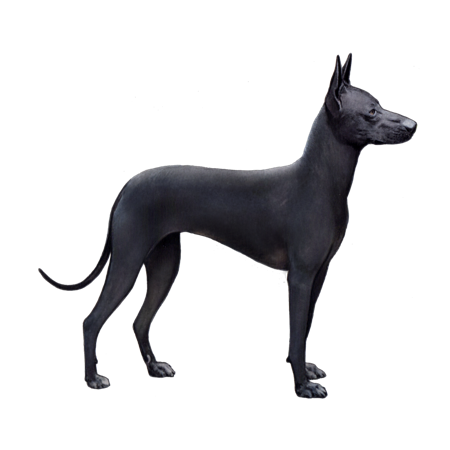
Rat Terrier
Rat Terriers are active, alert, and playful, with a more docile temperament than most terriers. If you're searching for an intelligent breed that forms close bonds with its family, look no further than the Rat Terrier.
Interested in discovering if your dog is a Rat Terrier?
Check out Wisdom Panel's DNA tests.

Rat Terrier Traits
General Appearance
Don't let the size of the Rat Terrier fool you—it's small but mighty! Rat Terriers have compact, well-balanced, and portable bodies. They also come in a miniature size.
Coat and Coloring
The Rat Terrier sports a variety of coat colors, usually consisting of a white, patched pattern called "pied." The breed's coat is always short, smooth, and shiny.
Distinctive Physical Traits
Rat Terriers have a smooth and wedge-shaped head, sharp features, and a small but muscular body.
Rat Terrier Temperament
Rat Terriers have a reputation as good family pups. However, they may develop small dog syndrome—a behavioral problem where little dogs think they're in charge.
A Rat Terrier with small dog syndrome might constantly bark, nip at strangers, or challenge their owners. Fortunately, firm and consistent correction—along with early socialization—will help prevent these behaviors.
Most Rat Terriers are easy-going around children, but they might be aloof with strangers. (Relatedly, they also make vigilant watchdogs without being too yappy.) Highly active, Rat Terriers need plenty of exercise and human companionship.


Rat Terrier History
The Rat Terrier breed started with Fox Terriers and various mixed terriers brought to the United States from England. And over time, breeders introduced other dogs to help them control different types of vermin.
For instance, breeders added Whippets to the Rat Terrier bloodline in the early 20th century to address a Kansas Jack Rabbit problem. They also incorporated Beagles to add pack instincts. These crosses gave the Rat Terrier a different temperament compared to other terriers, making the breed easier to live with and much less aggressive.
President Theodore Roosevelt owned a Rat Terrier while he was in the White House. And more than a century later, these loving dogs continue to get our vote. The Rat Terrier received American Kennel Club recognition in 2013.
Rat Terrier Care
Nutrition
Rat Terriers need a high-quality food that's formulated for their age and size. Make sure to keep an eye on how much your Rat Terrier eats and reduce portions if your pup gains weight. Also, remember that giving too many treats in addition to regular meals can contribute to obesity.
Grooming
The short and dense coat of the Rat Terrier needs very little grooming to stay in good shape. A weekly sweep with a soft brush or hound glove should work well. Rat Terriers shed seasonally. A rubber brush or shedding tool will help during those times.
About once a month, your Rat Terrier will likely need a bath and nail trim. Also, check your Rat Terrier's ears weekly to remove wax buildup or debris. Daily teeth brushing is also a good habit to maintain.
Exercise
Rat Terriers can often get enough exercise just from playing indoors. But outdoor activities—such as taking walks or chasing balls—are also important for your dog's mental and physical health. The breed also enjoys dog sports, including agility, obedience, and rally.
Because of their strong prey drive and tendency to chase, Rat Terriers should always be on a leash or in a secure, fenced-in area when outside.
Training
Rat Terriers are usually easy to train and eager to please. But they have a typical terrier temperament—which means they can sometimes be stubborn and independent. That said, Rat Terriers are remarkably perceptive and respond well to praise and positive obedience training methods.

Rat Terrier Genetic Health Conditions
-
Congenital Hypothyroidism (Discovered in the Toy Fox and Rat Terrier)
Congenital Hypothyroidism is a disease of insufficient thyroid hormone production. As this hormone is important in many aspects of the metabolism and development, the result is a wide variety of signs including slow growth, dwarfism, and mental impairment.
-
Primary Lens Luxation
Primary Lens Luxation (PLL) is a condition that can cause the lens of the eye to become loose and eventually displace. The disorder is caused by degeneration of the fibers that hold the lens in place.
Knowing if your Rat Terrier is a carrier or at-risk for these conditions can help you and your veterinarian plan for your pup’s lifelong care. With Wisdom Panel™ Premium, you can get results for over 200 genetic health tests.
Breed Group
Terrier
The Terrier Group ancestors were bred to hunt and kill vermin. They are often characterized as feisty and energetic dogs whose sizes range from fairly small to much larger.
Resources
https://www.google.com/books/edition/Rat_Terriers/GhzPDAAAQBAJ
https://www.akc.org/dog-breeds/rat-terrier/
Reviewed July 26, 2020 by Annette Louviere, DVM





















































